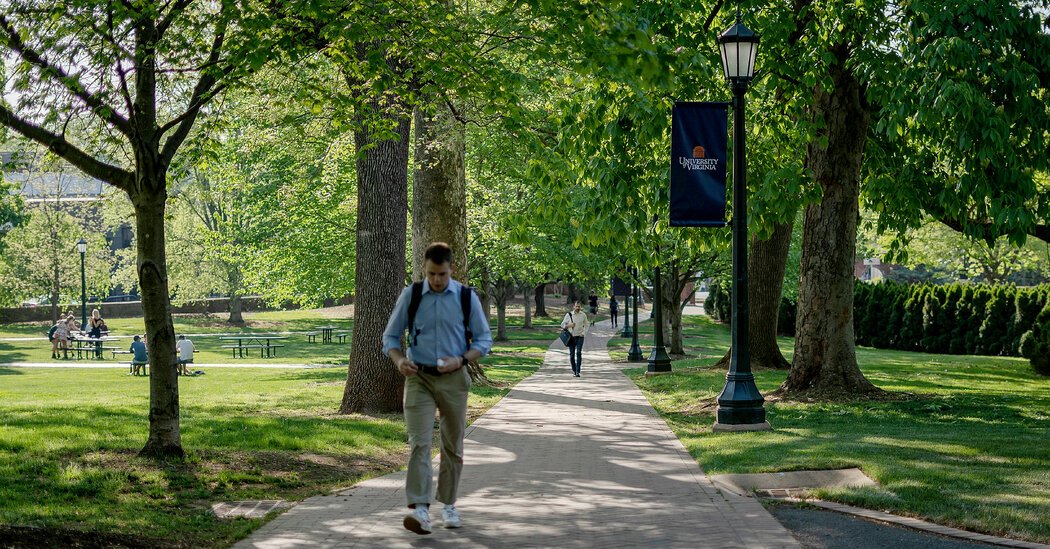Virginia will end legacy admissions at public universities after Gov. Glenn Youngkin signed a bill on Friday banning the practice that gives applicants with family ties to alumni a boost.
Under House Bill 48, public universities in the state will be barred from giving preferential treatment to applicants based on their connections to not only alumni but to donors as well. That means universities can also no longer give an advantage to applicants whose relatives make donations to the school. Critics of such preferences have said for years that the century-old practice perpetuates privilege.
The ban will notably affect the University of Virginia and William & Mary, which are among the country’s more selective public universities. Virginia Tech, another prestigious public university, already announced last year that it would no longer take an applicant’s legacy status into account in the admissions process.
The law, which passed unanimously in the Virginia House of Delegates and the State Senate this year, will take effect July 1, after admissions decisions have been made for this fall. Mr. Youngkin, a Republican, said in a statement in January that he believed “admission to Virginia’s universities and colleges should be based on merit.”
Virginia is the second state to ban legacy admissions, after Colorado, and similar legislation is being considered in New York and Connecticut, among others.
State Senator Schuyler T. VanValkenburg, a Democrat who sponsored the bill, said he was pleasantly surprised by the bipartisan support for the ban. He said he hoped Virginia’s decision will lead other states to follow suit, which he said would help promote diversity in college admissions.
“It’s kind of an indefensible policy, especially in light of affirmative action being declared unconstitutional by the Supreme Court,” Mr. VanValkenburg said in an interview. “There’s a lot of ways you can measure merit, but we know that legacy admissions is really not about merit at all.”
The University of Virginia did not immediately respond to requests for comment on Sunday.
William & Mary has said in a statement that it does not anticipate the legislation having a significant impact on its admissions process, because the university does not have a separate standard for applicants with legacy status. But data from the school has shown that accepted applicants with the status were more than twice as likely to enroll at the school as other accepted applicants were. The university did not comment beyond referring to the statement.
Legacy admissions have been under renewed scrutiny after the Supreme Court struck down affirmative action across colleges and universities last June, banning considerations of race in applications.
The movement to eliminate legacy admissions has received support from both Republicans and Democrats on several levels of government. President Biden has also weighed in, saying such preferences expand “privilege instead of opportunity.”
Senators Tim Kaine, a Democrat from Virginia, and Todd Young, a Republican from Indiana, are pushing to ban the practice at the federal level. In November, they introduced the Merit-Based Educational Reforms and Institutional Transparency Act, which would establish federal standards for assessing college admissions processes and make considerations of an applicant’s legacy and donor status illegal. The bill is being considered by the Senate Committee on Health, Education, Labor and Pensions.
In a joint statement, the senators applauded the new law in Virginia. “Now let’s build off this success and get our bill passed to end legacy and donor admissions preferences nationwide,” Mr. Kaine and Mr. Young said. “This will promote upward mobility and fairness in the admissions process.”
But critics of such measures argue that there are adverse effects to banning legacy considerations and that minority students could actually benefit from having familial connections in higher education. There are also concerns about the impact on alumni donor relations if legacy admissions are no longer allowed.
This year, an organization of conservative Virginia alumni known as the Jefferson Council expressed being split on the Virginia legislation.
“We are of two minds,” James A. Bacon, the group’s executive director, wrote in an email. On one hand, he said, intergenerational families tend to be more loyal and generous to the university. “On the other, we support merit-based admissions based on character and academic achievement.” The group did not immediately respond to a request to comment on Sunday.
Since the Supreme Court ruling, several selective private schools, including Wesleyan University and New York University, have decided to eliminate legacy preferences. But many elite private colleges, including Harvard, Yale and Brown, have not. The U.S. Department of Education has opened investigations into Harvard and the University of Pennsylvania and their use of legacy preferences.
“Legacy admissions are inherently unfair,” Mr. VanValkenburg said, adding that universities that heavily rely on the practice are “distorting what a freshman class looks like.”
Stephanie Saul and Vimal Patel contributed reporting.

